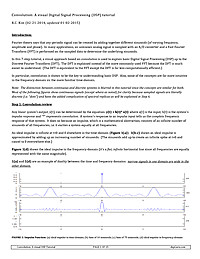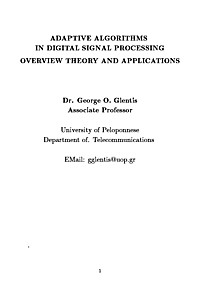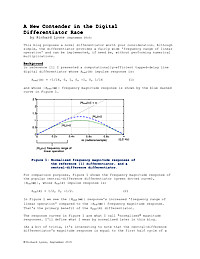
A New Contender in the Digital Differentiator Race
This blog proposes a novel differentiator worth your consideration. Although simple, the differentiator provides a fairly wide 'frequency range of linear operation' and can be implemented, if need be, without performing numerical multiplications.
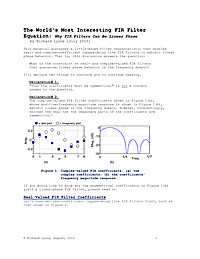
The World's Most Interesting FIR Filter Equation: Why FIR Filters Can Be Linear Phase
This article discusses a little-known filter characteristic that enables real- and complex-coefficient tapped-delay line FIR filters to exhibit linear phase behavior. That is, this article answers the question: What is the constraint on real- and complex-valued FIR filters that guarantee linear phase behavior in the frequency domain?
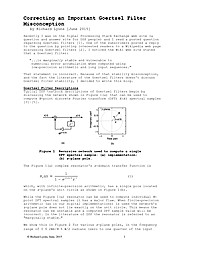
Correcting an Important Goertzel Filter Misconception
Correcting an Important Goertzel Filter Misconception
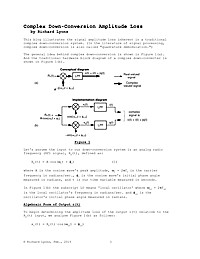
Complex Down-Conversion Amplitude Loss
This article illustrates the signal amplitude loss inherent in a traditional complex down-conversion system. (In the literature of signal processing, complex down-conversion is also called "quadrature demodulation.")
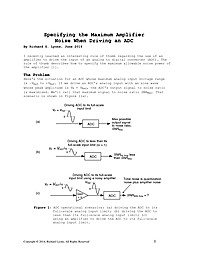
Specifying the Maximum Amplifier Noise When Driving an ADC
I recently learned an interesting rule of thumb regarding the use of an amplifier to drive the input of an analog to digital converter (ADC). The rule of thumb describes how to specify the maximum allowable noise power of the amplifier.
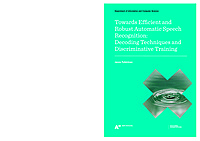
Towards Efficient and Robust Automatic Speech Recognition: Decoding Techniques and Discriminative Training
Automatic speech recognition has been widely studied and is already being applied in everyday use. Nevertheless, the recognition performance is still a bottleneck in many practical applications of large vocabulary continuous speech recognition. Either the recognition speed is not sufficient, or the errors in the recognition result limit the applications. This thesis studies two aspects of speech recognition, decoding and training of acoustic models, to improve speech recognition performance in different conditions.
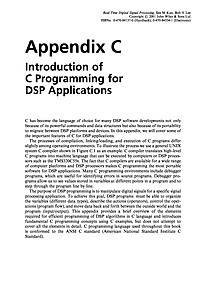
Introduction of C Programming for DSP Applications
Appendix C of the book : Real-Time Digital Signal Processing: Implementations, Application and Experiments with the TMS320C55X
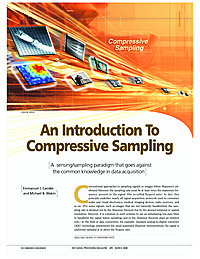
An Introduction To Compressive Sampling
This article surveys the theory of compressive sensing, also known as compressed sensing or CS, a novel sensing/sampling paradigm that goes against the common wisdom in data acquisition.
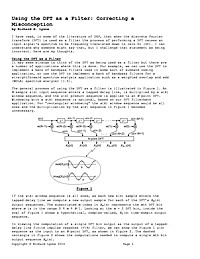
Using the DFT as a Filter: Correcting a Misconception
I have read, in some of the literature of DSP, that when the discrete Fourier transform (DFT) is used as a filter the process of performing a DFT causes an input signal's spectrum to be frequency translated down to zero Hz (DC). I can understand why someone might say that, but I challenge that statement as being incorrect. Here are my thoughts.
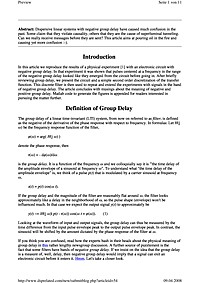
Negative Group Delay
Dispersive linear systems with negative group delay have caused much confusion in the past. Some claim that they violate causality, others that they are the cause of superluminal tunneling. Can we really receive messages before they are sent? This article aims at pouring oil in the fire and causing yet more confusion :-).
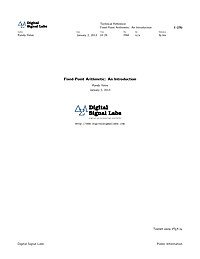
Fixed-Point Arithmetic: An Introduction
This document presents definitions of signed and unsigned fixed-point binary number representations and develops basic rules and guidelines for the manipulation of these number representations using the common arithmetic and logical operations found in fixed-point DSPs and hardware components.
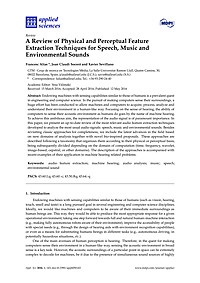
A Review of Physical and Perceptual Feature Extraction Techniques for Speech, Music and Environmental Sounds
Endowing machines with sensing capabilities similar to those of humans is a prevalent quest in engineering and computer science. In the pursuit of making computers sense their surroundings, a huge effort has been conducted to allow machines and computers to acquire, process, analyze and understand their environment in a human-like way. Focusing on the sense of hearing, the ability of computers to sense their acoustic environment as humans do goes by the name of machine hearing. To achieve this ambitious aim, the representation of the audio signal is of paramount importance. In this paper, we present an up-to-date review of the most relevant audio feature extraction techniques developed to analyze the most usual audio signals: speech, music and environmental sounds. Besides revisiting classic approaches for completeness, we include the latest advances in the field based on new domains of analysis together with novel bio-inspired proposals. These approaches are described following a taxonomy that organizes them according to their physical or perceptual basis, being subsequently divided depending on the domain of computation (time, frequency, wavelet, image-based, cepstral, or other domains). The description of the approaches is accompanied with recent examples of their application to machine hearing related problems.
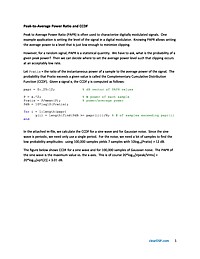
Peak-to-Average Power Ratio and CCDF
Peak to Average Power Ratio (PAPR) is often used to characterize digitally modulated signals. One example application is setting the level of the signal in a digital modulator. Knowing PAPR allows setting the average power to a level that is just low enough to minimize clipping.

The World's Most Interesting FIR Filter Equation: Why FIR Filters Can Be Linear Phase
This article discusses a little-known filter characteristic that enables real- and complex-coefficient tapped-delay line FIR filters to exhibit linear phase behavior. That is, this article answers the question: What is the constraint on real- and complex-valued FIR filters that guarantee linear phase behavior in the frequency domain?
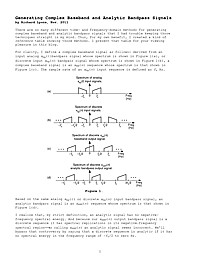
Generating Complex Baseband and Analytic Bandpass Signals
There are so many different time- and frequency-domain methods for generating complex baseband and analytic bandpass signals that I had trouble keeping those techniques straight in my mind. Thus, for my own benefit, I created a kind of reference table showing those methods. I present that table for your viewing pleasure in this document.
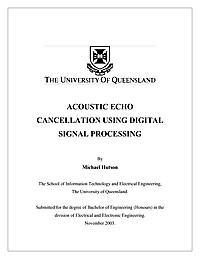
Acoustic Echo Cancellation using Digital Signal Processing
Acoustic echo cancellation is a common occurrence in todays telecommunication systems. It occurs when an audio source and sink operate in full duplex mode, an example of this is a hands-free loudspeaker telephone. In this situation the received signal is output through the telephone loudspeaker (audio source), this audio signal is then reverberated through the physical environment and picked up by the systems microphone (audio sink). The effect is the return to the distant user of time delayed and attenuated images of their original speech signal. The signal interference caused by acoustic echo is distracting to both users and causes a reduction in the quality of the communication. This thesis focuses on the use of adaptive filtering techniques to reduce this unwanted echo, thus increasing communication quality. Adaptive filters are a class of filters that iteratively alter their parameters in order to minimise a function of the difference between a desired target output and their output. In the case of acoustic echo in telecommunications, the optimal output is an echoed signal that accurately emulates the unwanted echo signal. This is then used to negate the echo in the return signal. The better the adaptive filter emulates this echo, the more successful the cancellation will be. This thesis examines various techniques and algorithms of adaptive filtering, employing discrete signal processing in MATLAB. Also a real-time implementation of an adaptive echo cancellation system has been developed using the Texas Instruments TMS320C6711 DSP development kit.
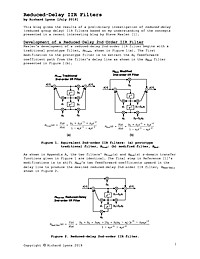
Reduced-Delay IIR Filters
This document describes a straightforward method to significantly reduce the number of necessary multiplies per input sample of traditional IIR lowpass and highpass digital filters.








